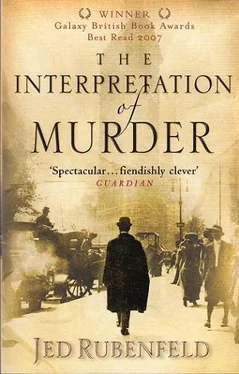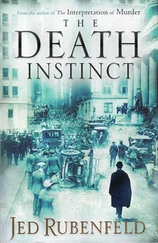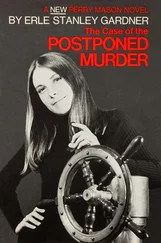Jed Rubenfeld - The Interpretation of Murder
Здесь есть возможность читать онлайн «Jed Rubenfeld - The Interpretation of Murder» весь текст электронной книги совершенно бесплатно (целиком полную версию без сокращений). В некоторых случаях можно слушать аудио, скачать через торрент в формате fb2 и присутствует краткое содержание. Жанр: Исторические приключения, на английском языке. Описание произведения, (предисловие) а так же отзывы посетителей доступны на портале библиотеки ЛибКат.
- Название:The Interpretation of Murder
- Автор:
- Жанр:
- Год:неизвестен
- ISBN:нет данных
- Рейтинг книги:5 / 5. Голосов: 1
-
Избранное:Добавить в избранное
- Отзывы:
-
Ваша оценка:
- 100
- 1
- 2
- 3
- 4
- 5
The Interpretation of Murder: краткое содержание, описание и аннотация
Предлагаем к чтению аннотацию, описание, краткое содержание или предисловие (зависит от того, что написал сам автор книги «The Interpretation of Murder»). Если вы не нашли необходимую информацию о книге — напишите в комментариях, мы постараемся отыскать её.
The Interpretation of Murder — читать онлайн бесплатно полную книгу (весь текст) целиком
Ниже представлен текст книги, разбитый по страницам. Система сохранения места последней прочитанной страницы, позволяет с удобством читать онлайн бесплатно книгу «The Interpretation of Murder», без необходимости каждый раз заново искать на чём Вы остановились. Поставьте закладку, и сможете в любой момент перейти на страницу, на которой закончили чтение.
Интервал:
Закладка:
Miss Acton almost certainly overheard the last comment. I saw her now writing a new note for us. I went to her and received it; I want to go home, it said. Now.
McClellan immediately told the girl he could not allow it. Criminals had been known, he warned her, to return to the scene of their crime. The assailant might be keeping watch over her house even now. Fearing that she could identify him, he might believe his only hope of escaping justice was to take her life. Returning to Gramercy Park was therefore out of the question, at least until her father was back in town to assure her safety. At this, Miss Acton's face changed again and she made a gesture with her hands, expressing an emotion I could not identify.
'I have it,' McClellan announced. Miss Acton, he said, would be taken to the Hotel Manhattan, where we were staying. The mayor himself would pay for her rooms. She would be settled there along with Mrs Biggs, the old housekeeper, who could see to it that proper attire and other necessaries were sent up from Gramercy Park. Miss Acton would stay at the hotel until her parents returned from the country. This arrangement would be not only the safest but the most convenient for purposes of commencing her treatment.
'There is a further difficulty,' said Freud. 'Psychoanalysis requires from the doctor a substantial commitment of time. Obviously I cannot make such a commitment. Neither can my colleague Dr Ferenczi. What about you, Younger? Will you take her on?'
Freud saw by my hesitation that I wished to respond privately to him. He drew me aside.
'It should be Brill,' I said, 'not me.'
Freud fixed me again with the look that could bore into rock. He replied quietly, 'I have no doubt of your abilities, my boy; your case history proves them. I want you to take her on.'
It was simultaneously an order I could not disobey and an expression of confidence whose effect on me I cannot describe. I agreed.
'Good,' he said aloud. 'She is yours. I will supervise as long as I remain in America, but Dr Younger will perform the analysis. Assuming, of course,' he added, turning toward Miss Acton, 'that our patient is as willing as we are.'
Part 2
Chapter Six
Coroner Hugel's sunken cheeks, Detective Littlemore noticed on Tuesday morning, were looking even hollower than usual. The pouches below his eyes had pouches of their own, the dark circles their own circles. Littlemore felt sure his discoveries would boost the coroner's spirits.
'Okay, Mr Hugel,' said the detective, 'I went back to the Balmoral. Wait till you hear what I got.'
'You spoke with the maid?' Hugel asked immediately.
'Doesn't work there anymore,' answered the detective. 'She was fired.'
'I knew it!' the coroner exclaimed. 'Did you get her address?'
'Oh, I found her all right. But here's the first thing: I went back to Miss Riverford's bedroom to look at that molding on the ceiling — you know, the bowling-ball thing you said she was tied up to? You were right. There were rope threads on it.'
'Good. You secured them, I trust?' said Hugel.
'I got 'em. And the whole ball too,' said Littlemore, provoking an unpleasant look of foreboding on the coroner's face. The detective continued: 'I didn't think it looked very strong, so I got up on the bed and gave it a good yank, and it broke right off.'
'You didn't think the ceiling looked very strong,' the coroner repeated, 'so you gave it a yank, and it broke. Excellent work, Detective.'
'Thanks, Mr Hugel.'
'Perhaps you could destroy the whole room next time. Is there any other evidence you damaged?'
'No,' answered Littlemore. 'I just don't get the way it broke off so easy. How could it hold her up?'
'Well, it obviously did.'
'There's more, Mr Hugel, something big. Two things.' Littlemore described the unknown man who left the Balmoral around midnight on Sunday carrying a black case. 'How about that, Mr Hugel?' asked the detective proudly. 'It could be him, right?'
'They're certain he wasn't a resident?'
'Positive. Never saw him before.'
'Carrying a bag, you say?' asked Hugel. 'In what hand?'
'Clifford didn't know.'
'You asked?'
'Sure did,' said Littlemore. 'Had to check the guy's dexterity.'
Hugel grunted dismissively. 'Well, it's not our man anyway.'
'Why not?'
'Because, Littlemore, our man has graying hair, and our man lives in that building.' The coroner grew animated.
'We know Miss Riverford had no regular visitors. We know she had no visitors from outside the building on Sunday night. How then did the murderer get into her apartment? The door was not forced. There is only one possibility. He knocked; she answered. Now, would a girl, living alone, open her door to just anyone? In the nighttime? To a stranger? I doubt it very much. But she would open it to a neighbor, someone who lived in the building — someone she was expecting, perhaps, someone to whom she had opened her door before.'
'A laundry guy!' said Littlemore.
The coroner stared at the detective.
'That's the other thing, Mr Hugel. Listen to this. I'm down in the basement of the Balmoral when I see this Chinaman tracking clay — red clay. I took a sample; it's the same clay I saw up in Miss Riverford's room, I'm sure of it. Maybe he's the killer.'
'A Chinaman,' said the coroner.
'I tried to stop him, but he got away. Laundry worker. Maybe this guy makes a laundry delivery to Miss Riverford on Sunday night. She opens the door for him, and he kills her. Then he goes back down to the laundry, and nobody's the wiser.'
'Littlemore,' said the coroner, taking a deep breath, 'the murderer was not a Chinese laundry boy. He is a wealthy man. We know that.'
'No, Mr Hugel, you figured he was wealthy because he strangled her with a fancy silk tie, but if you work in a laundry you clean silk ties all the time. Maybe this
Chinaman steals one from there and kills Miss Riverford with it.'
'With what motive?' asked the coroner.
'I don't know. Maybe he likes killing girls, like that guy in Chicago. Say, Miss Riverford comes from Chicago. You don't think — ?'
'No, Detective, I don't. Nor do I think your Chinaman has anything to do with Miss Riverford's murder.'
'But the clay — '
'Forget the clay.'
'But the Chinaman ran when — '
'No Chinaman! Do you hear me, Littlemore? No Chinaman figures in any way in this murder. The killer is at least six feet tall. He is white: the hairs I found on her body are Caucasian. The maid — the maid is the key. What did she tell you?'
I got to breakfast with about fifteen minutes to spare before I was to call on Miss Acton. Freud was just sitting down. Brill and Ferenczi were already at table, Brill with three empty plates in front of him and at work on a fourth. I had told him yesterday that Clark would pay for his breakfast. He was evidently making up for lost time.
'Now this is America,' he said to Freud. 'You begin with toasted oats in sugar and cream, then hot leg of lamb with French-fried potatoes, a basket of raised biscuits with fresh butter, and finally buckwheat cakes with syrup tapped from Vermont maples. I am in heaven.'
'I am not,' Freud replied. He was apparently in some digestive distress. Our food, he said, was too heavy for him.
'For me too,' complained Ferenczi, who had nothing but a cup of tea before him. He added unhappily, 'I think it was mayonnaise salad.'
'Where is Jung?' asked Freud.
'I haven't any idea,' answered Brill. 'But I do know where he went Sunday night.'
'Sunday night? He went to bed Sunday night,' said Freud.
'Oh, no, he didn't,' Brill replied, in what was evidently meant to be a tantalizing tone. 'And I know whom he was with. Here, I'll show you. Look at this.'
From below his seat, Brill withdrew a thick sheaf of papers, wrapped in rubber bands, perhaps three hundred pages. The top page read, Selected Papers on Hysteria and Other Psychoneuroses by Sigmund Freud, translation and preface by A. A. Brill. 'Your first book in English,' said Brill, handing the manuscript to Freud with a glowing pride I had never seen him reveal before. 'It will be a sensation, you'll see.'
Читать дальшеИнтервал:
Закладка:
Похожие книги на «The Interpretation of Murder»
Представляем Вашему вниманию похожие книги на «The Interpretation of Murder» списком для выбора. Мы отобрали схожую по названию и смыслу литературу в надежде предоставить читателям больше вариантов отыскать новые, интересные, ещё непрочитанные произведения.
Обсуждение, отзывы о книге «The Interpretation of Murder» и просто собственные мнения читателей. Оставьте ваши комментарии, напишите, что Вы думаете о произведении, его смысле или главных героях. Укажите что конкретно понравилось, а что нет, и почему Вы так считаете.












